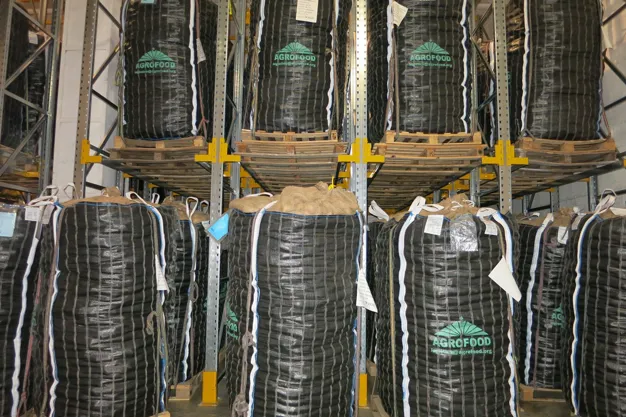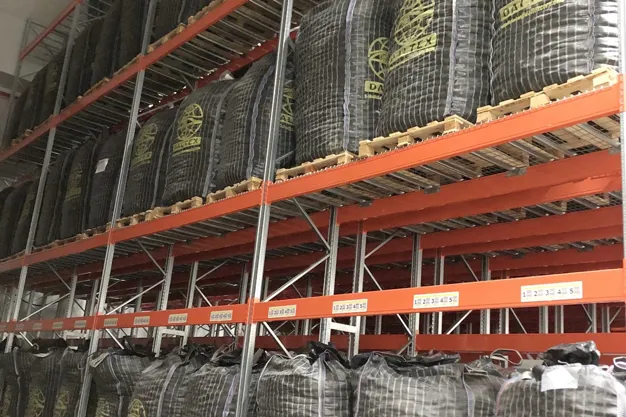The Egyptian Central Bank is once again trying to devalue the Egyptian Lira and remedy the lack of foreign currency in banks, which is heavily affecting local importers and which has reduced exports to a minimum in a country that used to be the leading extra-European market for Italian apples up until a couple of years ago.
 Left to right: Patrik Filistun (Tramaco Koper) and Paolo Triossi (Tramaco Ravenna)
Left to right: Patrik Filistun (Tramaco Koper) and Paolo Triossi (Tramaco Ravenna)
Riccardo Martini, CEO at DCS Tramaco, a refrigerated transport company boasting thirty years of experience dealing with the Egyptian fresh produce sector, commented on the recent measures introduced by the Egyptian Central Bank, which could relaunch the exports of Italian fruit to the north-African country.
"On March 16th, with the aim of countering the exchange of currency on the black market, the Egyptian Central Bank allowed the free fluctuation of the Dollar-Euro exchange, which immediately depreciated by 40%. The Euro, for example, which used to be exchanged at 71 EGP, has now dropped to 51. These measures were essential to give new stability to the Egyptian monetary system, an essential condition to release new funding by the FMI and reach agreements concerning the investments in Egypt to be made by the Emirates and Saudi Arabia. This should breathe new life into the Egyptian finances, which also have to deal with a lack of foreign currency caused by the blocked transit on the Red Sea."
 Frigo Logipark Ravenna, Egyptian potatoes in storage
Frigo Logipark Ravenna, Egyptian potatoes in storage
Are these measures having the desired effects? Martini reports that "it is too early to say, but we have registered cautious optimism by the traditional Italian exporters. Of course, the re-evaluation of the local currency makes our products cheaper. If Egyptian importers will actually find foreign currency in their banks, we can hope for a recovery of the market."
 Riccardo Martini and Gabriele Pietrini with clients during Fruit Logistica
Riccardo Martini and Gabriele Pietrini with clients during Fruit Logistica
"We must say that the Egyptian fresh produce sector is now very dynamic and flexible. In fact, many leading producers have understood the added value of their exports, which generate Euros and Dollars, and are starting to contact European exporters to become partners able to obviate the foreign currency negotiation issue in local banks."
 Egyptian potatoes stored in the Tramaco refrigerated warehouse in Venice
Egyptian potatoes stored in the Tramaco refrigerated warehouse in Venice
The revaluation of the local currency could have a negative impact on Egyptian exports, but Martini says that "this could be tolerated by the Egyptian production, which Europe increasingly depends on for the procurement of counterseasonal produce. The recurring drops in production in Europe have in fact been compensated by increasing imports from Egypt of products such as oranges, potatoes and onions. We have witnessed this over the past few days, as our warehouses in Ravenna and Venice were full of these products."
 Riccardo Martini, CEO of DCS Tramaco
Riccardo Martini, CEO of DCS Tramaco
"We must also consider that Egyptian exporters will benefit from the revaluation of their currency as fertilizers, packing and machinery are imported from abroad in hard currency. The crisis of the Red Sea has definitely caused more damage, considering that the Middle and Far East represent 30% of exports of their oranges, of which Egypt has become the leading producer worldwide. Circumnavigating Africa leads to an increase in costs and delivery times that is difficult to absorb. Hence the need to place larger quantities of oranges on other markets, of course leading to a drop in prices."
"Everything has been said on this topic. Everyone can see the effects of Italian exports via sea. The prolonged transit times and increase in leases have shortened the kiwifruit season by two months and are causing serious difficulties for the exports of apples to the leading markets for the period, i.e. the Middle East and India. We are hoping this absurd crisis will be resolved in time for the next season."
For further information:![]()
DCS Tramaco
Via Magazzini Anteriori, 63 - Ravenna
+39 0544 426711
[email protected]
www.tramaco.net
